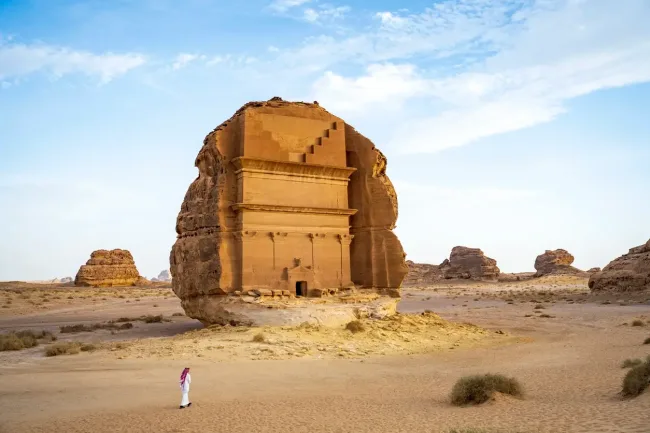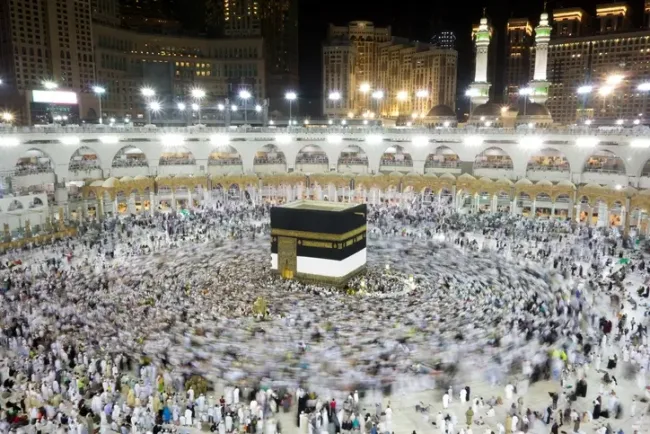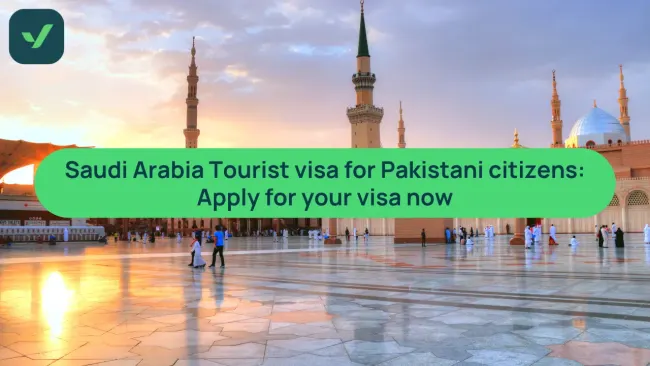
Saudi Arabia Visa: Entry requirements and pre-travel information for Saudi Arabia
Welcome to Saudi Arabia
Traveling to Saudi Arabia? You may need a visa – find out if you do, which type, and how to apply so you can get the paperwork out of the way and focus on your trip.

What’s the Saudi Arabia Tourist eVisa, and who’s it for?
Who’s the Saudi Arabian Tourist eVisa for?
The Saudi Arabia Tourist eVisa is available for citizens of more than 50 countries, including the United States, the United Kingdom, Canada, Australia, Germany, Japan, and Turkey.
Who’s not eligible for a Saudi Arabian Tourist eVisa? Citizens of Gulf Cooperation Council (GCC) countries Bahrain, Kuwait, Oman, Qatar, and the United Arab Emirates can travel to Saudi Arabia without a visa.
What’s the purpose of the Saudi Arabian Tourist eVisa? This visa is meant for tourist visits only. Muslim visa holders can also perform Umrah under certain conditions.
How long can you stay with a Saudi Arabian Tourist eVisa?
There are two types of eVisas available:
-
Single-entry: This visa is valid for three months from the issue date, granting a stay of up to 90 days in Saudi Arabia from the date of arrival.
-
Multiple-entry: Valid for one year after issue; this option permits multiple entries, granting a total stay of up to 90 days.
What’s the Saudi Arabia Tourist Visa, and who’s it for?
Who’s the Saudi Arabian Tourist Visa for?
Tourists not visa-exempt or eligible for the eVisa must apply for this regular Tourist Visa.
What’s the purpose of the Saudi Arabian Tourist Visa? Tourism, visiting family or friends, attending conferences or events, or engaging in other business activities. Muslim travelers can also perform Umrah under limited conditions.
How long can you stay with a Saudi Arabian Tourist Visa?
It offers a total validity of 1 year after issued and stays of up to 90 days in total. It’s a multiple-entry visa.
Learn more about the Saudi Arabia Tourist Visa
What’s the Saudi Arabia Electronic Visa Waiver, and who’s it for?

Who’s the Saudi Arabian Electronic Visa Waiver for?
The Saudi Arabia Visa Waiver is only available for citizens from the United Kingdom. However, more nationalities may be added to the visa waiver program soon. Stay tuned!
What’s the purpose of the Saudi Arabian Electronic Visa Waiver? Tourism or business. Muslim travelers can also perform Umrah under limited conditions.
How long can you stay with a Saudi Arabian Electronic Visa Waiver?
It allows a Single entry for up to 180 days per entry. You must use the travel authorization within 90 days after issued.
What’s the Saudi Arabia Umrah Visa, and who’s it for?
Who’s the Saudi Arabian Umrah Visa for?
The Saudi Arabia Umrah Visa is available for Muslim travelers from all over the world.
Who’s not eligible for a Saudi Arabian Tourist eVisa?
-
Citizens of Gulf Cooperation Council (GCC) countries Bahrain, Kuwait, Oman, Qatar, and the United Arab Emirates.* Those traveling for other reasons than the visa allows. For example, you cannot undertake general tourism activities, as this visa is only meant for religious tourism and Umrah.
-
Muslim women performing Umrah or Hajj must be accompanied by a male family member (father, brother, husband, son) aged 18 or older, or if over 45, can travel with a group of same-aged women led by a group leader until departure.
What’s the purpose of the Saudi Arabian Umrah Visa? Muslims undertaking the Umrah pilgrimage. Unlike other visas, it caters exclusively to religious needs, offering a spiritual journey to Islam's sacred sites in Mecca.
How long can you stay with a Saudi Arabian Umrah Visa? Typically, the Umrah Visa permits a single stay of up to 30 days.
-
Non-Muslim travelers.
-
Those wanting to perform Hajj.
What’s the Saudi Arabia Hajj Visa, and who’s it for?
Who’s the Saudi Arabian Hajj Visa for?
All foreign Muslim nationals must apply for a Saudi Hajj visa before traveling to the country during the Hajj season.
Who’s not eligible for a Saudi Arabian Hajj Visa?
-
Non-Muslim travelers.
-
GCC citizens who can enter Saudi Arabia visa-free during Hajj. However, they still need to apply for a Hajj permit through the Saudi government.
-
Hajj visas are not granted to individuals. They can only be obtained through a licensed agency or tour company that will assign you to a group.
-
Those traveling to Saudi Arabia for a reason different from what the visa allows.
What’s the purpose of the Saudi Arabian Hajj Visa? Muslims undertaking the Hajj pilgrimage. Unlike other visas, it caters exclusively to religious needs, offering a spiritual journey to Islam's sacred sites in Mecca.
How long can you stay with a Saudi Arabian Hajj Visa? This is a single-entry visa, expressly permitting entry and stay in Saudi Arabia only during the designated Hajj period.
At iVisa, we currently don’t offer these visas, but you can find out more from the Saudi Arabian government website.
What are the other Saudi Arabian visa options?
Differing from tourist or pilgrimage documents, Saudi Arabia Short-Stay (C-type) Visas are tailored for specific, brief visits:
-
Saudi Arabia Business Visa: This visa is for those visiting Saudi Arabia for business, such as attending meetings, conferences, fairs, or engaging in commercial activities.
-
Saudi Arabia Family Visit Visa: This visa caters to individuals planning to visit family or friends living in Saudi Arabia.
-
Saudi Arabia Government Visa: This visa is for individuals visiting Saudi Arabia for official government-related activities. It requires documentation from the respective government or official body.
-
Saudi Arabia Personal Visit Visa: Catered to individuals intending to visit Saudi Arabia for personal reasons. This can include visiting friends or acquaintances.
-
Saudi Arabia Extension of Exit/Re-Entry Visa: This visa is for those already in Saudi Arabia who need to extend their stay beyond the initial exit/re-entry visa terms.
-
Saudi Arabia Diplomatic Visa: The Diplomatic Visa is issued to foreign diplomats and officials visiting Saudi Arabia for official duties.
-
Saudi Arabia Diplomatic Missions & Organizations Visa: This is designated for diplomats, officials, and members of international organizations traveling to Saudi Arabia for official duties.
What are the Saudi Arabian long-term visa options?

Saudi Arabia offers several long-term visa options for various purposes, such as employment, study, business, and residence. Here are some common long-term visas:
-
Saudi Arabia Student Visa: For international students planning to study at a higher education institution, do a language course, or undergo a long-term internship in Saudi Arabia.
-
Saudi Arabia Employment Visa: An employee going to work for a Saudi Arabia-located business.
-
Saudi Arabia Residence Visa: For expats seeking long-term residence in Saudi Arabia, often linked to employment or family reunion purposes.
-
Saudi Arabia Premium Residency Visa: A special visa granting extended stay privileges and additional benefits aimed at high-net-worth individuals seeking long-term residency options in the Kingdom.
-
Saudi Arabia Companion Visa: Designed for family members accompanying primary visa holders, like workers or students, allowing families to reside together in Saudi Arabia.
Staying healthy in Saudi Arabia: Here’s what you need to know
Health facilities in Saudi Arabia for travelers are generally of a high standard, particularly in major cities like Riyadh, Jeddah, and Dammam. Here's what travelers should know.
Make sure to stay updated on routine vaccines
-
Consider vaccines for diseases like Hepatitis A and B or meningococcal meningitis.
-
A yellow fever vaccination certificate is required if you’re arriving from a country with a risk of yellow fever transmission.
-
You must present a vaccination certificate against meningitis if you’re performing Hajj or Umrah upon arrival or during your visa application.
-
Keep updated with Saudi Arabia's COVID-19 requirements, such as quarantine, testing, or vaccine certificates, through your airline or the Saudi Arabian government website.
Medical facilities
-
In major cities, you can expect a wide range of medical services, from general practice to specialized care. English is commonly spoken
-
Private healthcare facilities typically offer a higher standard of care and shorter waiting times than public hospitals.
-
Pharmacies are widely available, and many drugs that require prescriptions in other countries can be purchased over the counter.
-
Be aware of cultural practices, especially regarding gender. Some healthcare facilities may have separate areas or waiting rooms for men and women.
Health insurance
We’d always recommend taking out health insurance before you travel anywhere from any destination.
All the major cities in Saudi Arabia will have private medical care, but it’s expensive. You should choose travel insurance with high medical limits.
Contact your insurance provider before traveling to ensure you have the right level of coverage.
Other things to consider:
-
Trip cancellation, delay, and interruption benefits.
-
Medical expenses and medical evacuation benefits.
-
Baggage coverage.
Things to be aware of when visiting Saudi Arabia
Keep an extra eye on the following to keep healthy and safe during your trip to Saudi Arabia:
1. Food and water safety: Be cautious about water and food safety to avoid illnesses. Drinking bottled or purified water and being careful with street food is advisable.
2. Respiratory issues: The region experiences frequent sand and dust storms, which can cause respiratory problems, particularly for those with pre-existing conditions like asthma or allergies.
Medication for personal use
Follow these tips to bring over-the-counter medicines into Saudi Arabia:
-
Declare all medications: Report all medicines for personal use to customs authorities.
-
Original packaging: Always keep medicines in original containers and transparent bags in your hand luggage.
-
Prescription or doctor's letter: Present the medical prescription issued by your doctor or other competent authority in English.
-
Check for restrictions: Call Saudi Arabia's embassy to verify that all of your prescription(s) are legal to bring with you.
-
Quantity aligned with itinerary: Bring only a reasonable quantity that aligns with the duration of your stay to avoid complications.
-
Prohibited substances: Saudi Arabia has strict laws regarding narcotics and psychotropic substances. It's crucial to check if your medication contains any substance that might be considered illegal in Saudi Arabia.

 Australia ETA Online
Australia ETA Online
 United Kingdom ETA
United Kingdom ETA
 India Tourist eVisa
India Tourist eVisa
 Canada ETA Visa
Canada ETA Visa
 Turkey eVisa
Turkey eVisa
 Egypt eVisa
Egypt eVisa
 Singapore SG Arrival Card
Singapore SG Arrival Card
 Indonesia eVoa Visa
Indonesia eVoa Visa
 Aruba ED Card
Aruba ED Card


